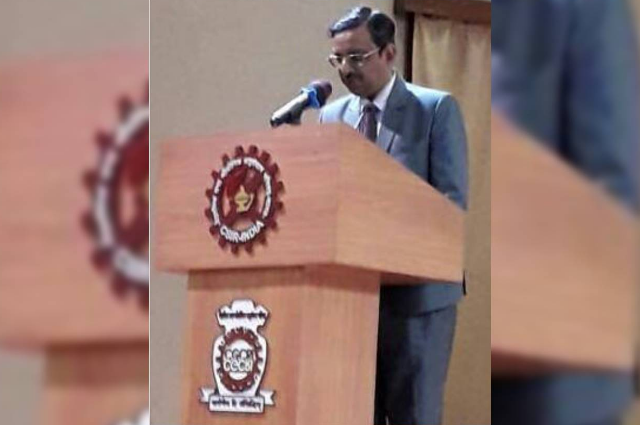
Date of Interview: June 15/2022
Location: Indian Science News Association (ISNA) office at the Raja Bazar Science College, University of Calcutta, Kolkata West Bengal
Dr. Amit Krishna De, current Advisor and Ex Executive Secretary of the Indian Science Congress Association (ISCA) has been a scientist per excellence. He did his Ph.D. from the Department of Biochemistry, Calcutta University of globally renowned late Prof Jagat Jibon Ghosh. He has been his 83rd and last Ph.D. scholar. Dr. De has made significant contributions to basic research on capsaicin, a bioactive compound found in Capsicum species (Chilli peppers) belonging to the family Solanaceae. Capsaicin and several related alkaloids are collectively called capsaicinoids; a group of pungent secondary metabolites with rich medicinal properties. Dr. De has over 100+ valuable research publications in national and international journals of repute. He has edited and written over 30+ books and received over dozen national and international awards and presented numerous lectures both in India and abroad. He has made significant contributions to research on Indian spices and medicinal plants. He has been associated with several scientific organizations at various levels and has been an acclaimed science communicator helping in the dissemination of science abs technology among the public.

Saikat Kumar Basu: What attracted you to becoming a biochemical scientist?
Amit Krishna De: I had a great passion for Chemistry from my school days and so I graduated with chemistry honors from Scottish Church College. During that time Biochemistry was booming as a new discipline of modern Chemistry with lots of explored areas for research. I was determined to move forward in life as a researcher so ejected Biochemistry as my Master’s discipline. I never regretted the decision as I had the opportunity to work on my Ph.D. with an eminent professor known all over the world for his extraordinary genius ideas and excellent publications. I was heavily inspired by Prof Jagot Jibran Ghosh and he was also my mentor who introduced me to the fascinating new field of biochemical research.
Saikat Kumar Basu: What are your major contributions to basic science in terms of your extensive research on capsaicin?
Amit Krishna De: Well, Prof J.J. Ghosh was interested in looking into the biochemical and medicinal properties of capsaicin; he introduced me to this discipline. I found this area of research so interesting that I have been ever since associated with it. Capsaicin is a valuable natural product found in chili and has excellent medicinal properties as an anti-inflammatory and anti-cancer natural plant product. It can be developed into a drug for treating several ailments and medical conditions with very little or no side effects.
Saikat Kumar Basu: How did you get involved with the Science Communication movement?
Amit Krishna De: I always loved Science Journalism as I feel it is important to make science available to all to make a better society. That means we have to make it simpler, non-technical as well as interesting for the public to accept it. This is a challenging field of work and I decided to put my efforts into generating more professionals to push Science Communication forward. Also, this gives me a great opportunity to meet bright young, and enthusiastic men and women each year who are interested in working for science dissemination among the public. I love this and enjoy working for it. So even after retirement, I am associated with ISNA for coordinating the training of a new batch of Science Communication students. I have been associated with ISNA now for over 20 years. It gives me great pleasure.
Saikat Kumar Basu: What are your plans concerning further upgrading the ISNA training program on Science Communication and Media Practices?
Amit Krishna De: I would like to make it more interactive and participatory. I believe in hands-on training directly in the field with the leaders of this specific discipline. That means visits to science laboratories, research institutes, and universities, interaction with academics, scientists, research scholars, academics, journalists, and lawyers to get a perspective of multiple disciplines to make my students all square to work in the field of Science Communication with confidence abs enthusiasm. It would be great if we could select through an open competition and provide a stipend for the selected students. I am also looking forward to making the curriculum more practical-oriented and field-based to add exposure and experience for our students. I would also like to add grades to our final certificates to identify the top 5% of students with due recognition with distinction for their top performance.
Saikat Kumar Basu: What do you feel about the current Indian science curriculum?
Amit Krishna De: I think the content as it is good and no doubt overloaded. But the question is how this is being delivered. Also, it would have been good to accommodate more time for the labs to attract students to science. But whether it would be possible under the current circumstances is a big question. I don’t think it is also quite right to overburden the already stressed students with more advanced content. It is better to learn things more comprehensively at this stage to build a good foundation for the future.
Saikat Kumar Basu: Do you think the teacher-student ratio is skewed in India with a heavy student load per teacher impacting the quality of science education?
Amit Krishna De: I do agree that Indian classrooms are big with a huge load of students per teacher. But I don’t think that it’s that big of an issue limiting the delivery of quality education. A dedicated teacher sincere towards his responsibility can manage a big class successfully if he/she is passionate about teaching. I have seen countless good teachers across India at schools, colleges, and universities who are doing an exceptional job with teaching. I sincerely believe that if the teacher is serious about his responsibility and both knowledgeable and comfortable with the subject he/she is dealing with, big classes are not an issue. Students always respect their dedicated teachers and together they always make a positive difference in the delivery of education at various levels.
Saikat Kumar Basu: What are your thoughts regarding the success of compulsory environmental education at the undergraduate level in India? Do you feel that it is percolating down and making students aware of environmental issues?
Amit Krishna De: Honestly speaking, I don’t see any utility in compulsory environmental courses for all undergraduate students. They are treating this as just another subject they need to pass to get their final degree. Hence, there is no connection between the students to the philosophy of ecology and environment. Undergraduate students are just memorizing the contents mechanically with very little percolation inside. Without any labs, project work or workshops, or visits to specific sites impacted by pollution there is minimal impact on environmental awareness among students. We need to think holistically and find solutions to our environmental problems through active research, monitoring, surveillance, and collecting some data. But the course curricula are already overloaded; environmental education and awareness are neglected. Ni e the mess at least students are learning about important environmental issues, which is appreciable.
Saikat Kumar Basu: What do you feel about India's booming private education industry? Can private education institutes slowly replace the government and government-funded institutes in the future?
Amit Krishna De: Private education industry is here to stay. The government can't provide and extend higher education opportunities to every corner of the country due to infrastructural and economical reasons. There is a huge demand for education and hence private institutes and universities are feeling that gap and catering to that demand. Private institutes now have good infrastructure and administration, high-quality laboratories and libraries, and highly qualified and experienced teachers.
Hence, such institutes are becoming increasingly popular among students across the country. Furthermore, the private institute has well-connected placement cells that help students to land jobs post-completion of their degrees. This is an added advantage. So both private and public institutes according to me are complementary to one another expanding the education horizon in India. The only challenge is that the cost of education at private institutes is much higher abs hence not affordable and accessible to a major section of our society. But there are various types of student loans available these days that can help. But the cost of education is certainly a big factor in availing education from private industry. I don’t think that private institutes can completely replace the public education sector at least for the next few decades.
Saikat Kumar Basu: How do you feel about online education from an Indian perspective?
Amit Krishna De: l appreciate the online education system for its ability to reach a wide diversity of students at different locations at the same time. I admire the technological progress in transforming our traditional classrooms into a wide corridor connecting students from various corners providing them with the opportunity to access high-quality education without having to move from their present locations. This saves money, energy, and other resources. However, I do have serious doubts regarding the effectiveness of dissemination of education through this mode of learning.
For me, face-to-face direct interaction as well as teacher-student bonding is necessary for delivering quality education. This part is missing in the online education system and hence I feel this creates a void in the learning process. It is also difficult to monitor students via the online mode abs many students take advantage of this weakness and are not serious about following online classes properly. Online education is quite challenging as a choice, particularly for lab-based subjects as we do not have the knowledge or abs gadgets right now to make this online for the students. Hence, we still need an offline education system to educate students properly. I feel online education is more suitable for nature abs advanced students to some extent. So overall I am personally not a big fan of online education; although I appreciate the positive points associated with it without hesitation.
Saikat Kumar Basu: Thank you so much for your time and for explaining the details in such an elegant manner. We look forward to interviewing again sometime in the future to share your new ideas, accomplishments, and new plans and strategies for promoting science to the public.
Amit Krishna De: You're welcome and thanks to you too for your questions. I also look forward to talking to you again. My best wishes for all your future endeavors.
